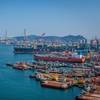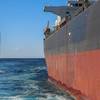AWO: Need for Congress to Enact Vessel Discharges Legislation
Friday’s decision by the U.S. Court of Appeals for the D.C. Circuit to reject three maritime industry associations’ challenge to the U.S. Environmental Protection Agency’s (EPA) Vessel General Permit (VGP) highlights the urgent need for Congressional action to establish a uniform and practical regulatory regime for vessel discharges, The American Waterways Operators (AWO) announced today. The VGP was developed by EPA in 2008 under the Clean Water Act National Pollutant Discharge Elimination System (NPDES) permitting program, designed to regulate discharges from land-based stationary sources. The permit contains baseline requirements established by EPA as well as more than 100 state- and waterbody-specific conditions required by individual states. AWO, the Lake Carriers’ Association and the Canadian Shipowners Association argued in court that EPA had violated the Administrative Procedure Act and the Regulatory Flexibility Act when it issued the final VGP without providing the regulated community an opportunity to comment on the 100+ state conditions that had been added to its draft permit, nor considering the economic impact of those state conditions on small businesses. The associations petitioned the court to vacate the section of the VGP containing the state conditions and remand it to the agency for further consideration consistent with the law.
In its July 22 ruling, the Court disagreed with EPA’s contention that it was not required to seek comment on state conditions or analyze the costs of complying with state conditions. However, the Court accepted EPA’s argument that the agency did not have the authority to alter or reject the state conditions, and that it was therefore unclear that providing notice and an opportunity for comment on the state conditions would have served any purpose. The Court suggested that Congress must amend the Clean Water Act to provide the maritime industry with a permanent solution to this problem.
The Court’s decision reinforces AWO’s long-held position that the NPDES permitting program is poorly suited for the regulation of discharges from mobile sources and that Congress needs to fix this broken system.
“A tow moving from Pittsburgh to New Orleans travels through the waters of 11 states,” said Jennifer Carpenter, AWO Senior Vice President – National Advocacy. “The court decision implies that even if those 11 states impose conflicting, overlapping or infeasible conditions applicable while the tow is in their waters – and even if EPA knows that those conditions are
unworkable – the agency has no authority under the Clean Water Act to reject or modify the state conditions.” Congress must act to resolve this “untenable” situation, Ms. Carpenter added.
Only two weeks ago, the bipartisan leadership of the House Subcommittee on Coast Guard and Maritime Transportation and the Subcommittee on Water Resources and the Environment called for legislation to replace the current patchwork of regulatory requirements with a consistent national program for the management of vessel discharges.
At the subcommittees’ joint hearing on July 13, Rep. Frank LoBiondo (R-NJ), Chairman of the Coast Guard Subcommittee, called the current system of vessel discharges regulation “unreasonable” and said, “The time has finally come to enact a clear, effective and uniform national standard” for vessel discharges. Rep. Rick Larsen (D-WA), Ranking Member of the Coast Guard Subcommittee, urged the subcommittee to “continue its bipartisan approach and develop legislation that resolves the uncertainties surrounding…ballast water and other discharges from vessels.”
In light of the Court’s ruling, AWO encourages Congress to move quickly to eliminate the current confusing and contradictory patchwork of requirements and establish an improved regulatory regime for vessel discharges that ensures both environmental protection and economic growth.











